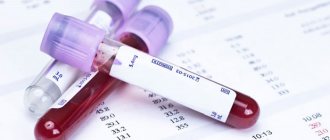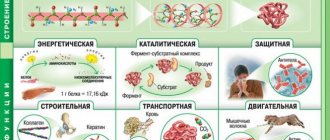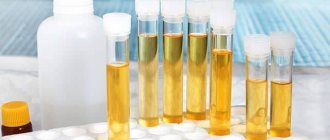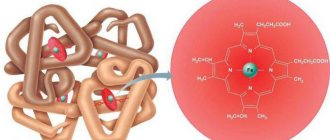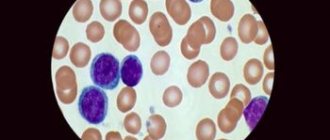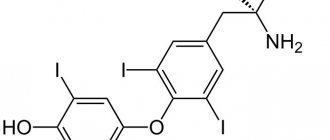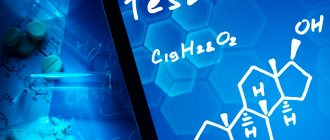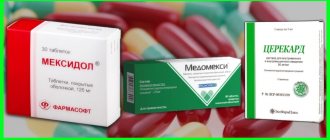Free T3 is a hormone important for the functioning of the human body, which is produced in the endocrine gland, called the thyroid gland. The full name of this substance is “triiodothyronine,” which reflects the number of iodine atoms contained in one molecule.
Free T3 is a hormone important for the functioning of the human body, which is produced in the endocrine gland, called the thyroid gland.
Characteristics of the thyroid gland
The thyroid gland is shaped like a shield or a butterfly, the “wings” of which are 50-60 mm wide and 55-80 mm high. Despite its small size and light weight (up to 20 g), its function is vital for the human body. The main function of the thyroid gland is to produce hormones such as thyroxine, iodotyrosine and triiodothyronine. The hormone thyroxine affects the growth and development of the body, increases the body's resistance to elevated temperatures. Thyroxine stimulates the functioning of cells, which under its influence become stronger, increasing their protective functions. Thyroxine, or T4, differs from the T3 hormone only by the presence of an extra iodine atom. Once in the body, thyroxine loses an additional atom, turning into the T3 hormone.
Free triiodothyronine is found in the body in very small quantities, since most of it is bound by special proteins. The protein-bound hormone T3 (more than 92% of it in the body) does not function, it is absolutely inactive. Takes part in many body processes, affecting the functioning of many internal organs and systems only free T3.
Difference between total and free T3
Triiodothyrotine is produced in some quantity by the thyroid gland, with 3 iodines of the atom. When it enters the bloodstream, the hormone interacts with protein molecules that act as transporters. After this, it is sent through the vessels to the tissues that need its work.
Free T3 hormone is triiodothyronine, which is found in a small proportion in the bloodstream without interacting with protein molecules. Total T3 is considered to be the hormone that remains free in combination with another protein-bound hormone. Its quantity determines the pathological processes of the thyroid gland.
Blood test for the hormone and its function in the human body
Many negative human health conditions, long-term chronic diseases that are difficult to treat, should make everyone think - what is the cause of such problems? It would be a good idea to undergo a comprehensive examination of internal organs and donate blood for hormones. In particular, to find out the amount of the T3 hormone, you need to donate blood for two tests:
- General T3. The content of triiodothyronine in the body as a whole is checked.
- Free T3. The total amount of hormones in bound and free states is summed up (the norm is up to 0.5%).
What functions does free triiodothyronine perform in the body? It turns out that its influence on the human body is colossal, since without it a person would not be able to grow and develop. Free T3 hormone affects such processes as:
- stimulation of metabolism;
- improving oxygen absorption by tissues;
- increasing the synthesis of vitamin A in one of the most important organs of the human body - the liver;
- reducing the amount of cholesterol and triglycerides in the blood;
- work of the central nervous system;
- increased excretion of calcium in urine;
- heat exchange in the body, etc.
General diseases
In some situations, both increased and decreased amounts of the hormones T3 and T4 from normal can cause the same diseases. One of the most well-known pathologies is the appearance of goiter, which is an enlargement of the thyroid gland. A goiter can compress vital organs in the neck, including the trachea and esophagus. This compression can lead to difficulty breathing and swallowing.
In the past, goiter was common due to iodine deficiency, but with the introduction of iodine supplements, the pathology has subsided. However, it continues to occur frequently in some less developed countries. Goiter can be a consequence of any of the thyroid diseases. A rare cause of goiter is thyroid hormone resistance syndrome, in which mutations in hormonal receptors reduce hormonal function.
Another disease, thyroiditis (inflammation of the thyroid gland), can also be associated with hypo- or hyperthyroidism. Thyroiditis can make itself felt by a sore throat, or it can be painless. The pathology most often occurs due to autoimmune diseases, infections, exposure to toxic substances, or other causes.
T4 is normal, TSH is elevated - what does this mean? 308384
Deviations from the norm
Thyroid hormones are produced by a child in the womb, playing an important role in the further development of almost all organs and their functions. Without thyroid hormones, a person would not be able to grow in height, and his mental abilities would be very limited. The human body's immune system also could not exist without thyroid hormones.
There are known cases when the thyroid gland stopped functioning in a child from an early age, as a result of which the grown-up person had the appearance of a first-grader, both in physical and mental indicators, which once again confirms the importance of hormones for the body. The thyroid gland is influenced by the pituitary gland and hypothalamus, regulating the production of hormones. The pituitary gland produces thyroid-stimulating hormone, which stimulates the production of triiodothyronine, thyroxine and affects the growth of the thyroid gland itself. External factors (stressful situations, hunger, severe fear) enter through nerve impulses into the hypothalamus, where the received information is processed and analyzed. The hypothalamus sends a signal to the pituitary gland by producing hormones, and the pituitary gland, in turn, signals the thyroid gland. Under the influence of signals received from the brain, the thyroid gland is capable of producing about 300 mcg of thyroid hormones per day.
The norm for free triiodothyronine for an adult is 3-6 pmol/l, and for total triiodothyronine - 1.3-3.1 mIU/l. In boys under 8 years of age, the amount of free hormone will be slightly less than in girls, but from the age of 10 this figure will be almost the same. In adulthood, there is a tendency towards a decrease in free triiodothyronine in the body.
Analysis
If a pathology in the thyroid gland is suspected, in addition to analyzing general markers, they always check the level of the hormones TSH, T3, T4.
Particularly significant is the analysis of T3 content. The fact is that when a nodular toxic goiter forms, there is an increased release of this substance in a free state.
The T3 concentration is determined by analyzing a venous blood sample. In order for the analysis to fully reflect the state of the body, it is necessary:
- donate blood on an empty stomach;
- a month before taking blood samples, stop taking medications containing thyroid hormones;
- reduce physical activity the day before.
In order for the analysis to be reliable, it is necessary to donate blood on an empty stomach, and a month before taking samples, stop taking medications containing these hormones.
Signs and symptoms of an elevated rate
The reasons why T3 may be elevated are varied. Normally, triiodothyronine has a positive effect on the central nervous system, so any deviations from the norm will inevitably affect the functioning of the central nervous system. Insufficient or excessive production of T3 will inevitably affect a person’s well-being, leading his nervous system to a state of increased excitability or, conversely, severe depression. The general condition will be similar to chronic fatigue, which the patient will refer to, unaware of the hormonal imbalance.
The cardiovascular system suffers no less from an increased or decreased amount of the hormone T3, since as a result of hormonal imbalance, the work of the heart muscle increases, which begins to work at an increased rate while the body remains at its usual pace. As a result, the muscle tissue does not have time to be saturated with oxygen and nutrients, and the increased work of the cardiovascular system and central nervous system leads to the fact that a person feels increased fatigue, muscle pain, and deterioration in well-being.
In general, three factors indicate a lack of the hormone T3 in the body:
- poor resistance to various diseases;
- the body’s ability to recover from various injuries and damage;
- the degree of protective functions during the onset of the disease.
The dependence of the immune system on thyroid hormones was discovered by scientists relatively recently. As a result of research, small receptors sensitive to triiodothyronine were identified on immune cells. Based on these and other observations, it was found that poor protective functions of the body and the presence of various immune diseases are closely related to thyroid hormones.
Thyroid hormones affect metabolism in the body. Thus, without them, it would be impossible for the body to absorb useful substances - vitamins, proteins, macro- and microelements. With an increase in the free T3 hormone in the body, a person may begin to lose weight sharply or, conversely, rapidly gain weight. Any corrective measures to correct weight, be it diet or exercise, are ineffective. What is happening in the body at this moment? Increased T3 hormone quickly utilizes fat in the body, further using proteins to increase energy. Symptoms of constantly irritable stomach and intestines, gastritis - all this can be associated with triiodothyronine disharmony. When the T3 hormone decreases, a person may experience constipation and poor digestion of food. As practice shows, it is the joint treatment of the gastrointestinal tract and thyroid gland that gives the most positive results than treatment of the digestive tract alone. This factor should definitely alert a person and prompt him to contact an endocrinologist.
https://youtu.be/orOjeNprEtM
If T3 is elevated, symptoms such as:
- headache;
- chronic high body temperature;
- increased blood pressure;
- tremor in the arms and upper face;
- diarrhea;
- insomnia;
- unstable psycho-emotional state;
- frequent urination;
- feeling of constant hunger;
- disruption of the menstrual cycle;
- growth of mammary glands in males.
With a reduced level of the T3 hormone, a person will experience the following symptoms: muscle weakness, a feeling of fatigue, pale skin, lack of sexual desire, constipation, decreased body temperature, impaired memory and sensitivity, swelling in the extremities, etc.
https://youtu.be/lllHazZdGpc
Reasons for the downgrade
If the thyroid gland does not produce enough hormone, it is hypothyroidism. The patient's metabolism slows down, he gains excess body weight, and his skin dries out. The patient suffers from fatigue, lack of energy and constipation. In addition, cold intolerance, swelling of the skin, hair loss, fatigue, and irregular menstrual cycles may occur. Severe hypothyroidism, called myxedema, can lead to heart failure, seizures and coma. In children, the disease can cause growth and development delays.
There are several types of this disease. Among them are:
- Congenital hypothyroidism.
- Hashimoto's thyroiditis.
- Lack of iodine.
Congenital hypothyroidism occurs in newborns. Its causes are inadequate levels of thyroid hormones, which appears due to its complete or partial absence, underdevelopment or abnormal location. In addition, the thyroid gland in newborns may not work due to its reduced or enlarged size. A child may remain underdeveloped physically or mentally if the problem is not detected and treated within the first two weeks of life. Tests to detect hypothyroidism are part of general newborn screening in many countries.
Hashimoto's thyroiditis is one of the most common diseases in which the immune system directs its activity (antibodies) to destroy thyroid tissue, which is why free T3 is reduced. As a result, inflammation, damage to gland tissue, and other problems occur.
With a lack of iodine, the ability of the thyroid gland to produce iodine-containing hormones decreases, and the free T3 norm in women and men is abnormal. The T4 molecule has four positions for iodine, and T3 has three. Iodine is a very common element in nature. Sea water and seaweed contain the largest amounts of iodine. Therefore, people who do not live near the sea often experience iodine deficiency in their bodies if they do not supplement this deficiency with nutritional supplements.
Where is it produced?
The hormone is produced in the follicles of the thyroid gland. Its production is regulated by thyroid-stimulating hormone (TSH) of the pituitary gland according to the principle of negative feedback:
- if T3 in the blood is higher than normal, TSH production is suppressed;
- if T3 in the blood is below normal, TSH production is activated.
The hormone is also formed during the breakdown of thyroxine (the cleavage of one iodine atom).
Triiodothyronine is more active than thyroxine, but is found in the blood in smaller quantities.
Thyroid stimulating is elevated, T4 is normal
Sometimes the question arises: can T4 and T3 be normal when thyroid-stimulating hormone is elevated? The answer to this question is yes. This condition is called subclinical (hidden) hypothyroidism. Currently, doctors have not come to a common point of view regarding the effectiveness of drug therapy for this form of the disease.
This is explained by the fact that the levels of active hormones T4 and T3 are normal. This means that although the levels of thyroid-stimulating hormone are increased, the thyroid gland is still coping with its tasks and producing the amount of hormones the body needs. Therefore, in this case, the attending physician usually takes a wait-and-see approach. This involves monitoring symptoms of hypothyroidism and having regular blood tests to determine their levels at regular intervals. And only when the increase in TSH reaches significant levels, drug therapy is prescribed.
Hypothyroidism is usually treated with synthetic T4 analogues, which include Levothyroxine and Synthroid. Another effective treatment for hypothyroidism is dried natural thyroid glands removed from pigs or sheep. However, there is no evidence that dried iron is more effective than hormonal medications.
What T3 indicators are considered normal?
There is also a difference between total and free T3 in normal values, so before you panic when you see suspiciously high or, conversely, low numbers on the form with the results of a blood test, take into account the form of the hormone being tested. Thus, the data obtained during the analysis depend on the age and gender of the patient. Normal results are shown in the table.
| Men | Age | Normal values (nmmol/l blood) | Women | Age | Normal values (nmmol/l blood) |
| From 4 days after birth to 1 year | Within 1.3 – 6.3 | From 4 days to a year | No more than 1.3 – 6.3 | ||
| From 1 to 12 years | From 1.74 to 2.91 | From one year to 12 years | Within 1.74 – 2.91 | ||
| From 12 to 15 years | From 1.5 to 2.71 | 12-15 years | 1,5 – 2,71 | ||
| At 15-17 years old | Within 1.45 – 2.39 | From 15 to 17 years old | 1,44 – 2,15 | ||
| At 17-19 years old | From 1.59 to 2.08 | 17-19 years old | 1,59 – 2,08 | ||
| Over 19 years old | From 0.89 to 2.44 | After 19 years | 0,89 – 2,44 |
If your total T3 is low or high, don’t worry right away - test results can be influenced by various factors:
- taking estrogen-based medications;
- treatment with tamoxifen, methadone, clofibrate and lithium preparations (these substances cause an increase in the level of the T3 hormone);
- the use of anabolic steroids, androgens, aspirin, etc. (reduce the level of the T3 hormone);
- pregnancy period (leads to increased performance);
- viral lesions or liver dysfunctions that increase indicators.
If the total T3 hormone is low, this indicates that there has been a significant decrease in other hormones produced by the thyroid gland. The patient cannot help but notice changes in well-being, since under such circumstances he will be tormented by constant drowsiness, lethargy, apathy, sudden mood swings, sudden numbness of the limbs, attacks of nausea, dizziness, decreased appetite and many other unpleasant symptoms.
It is impossible to take measures on your own before passing the full diagnostic complex, since, at best, this will not give results. At worst, the patient will only harm himself, thereby wasting precious time that could have been spent on proper treatment of his existing pathology.
Treatment of subclinical hypothyroidism
Diagnosing pathology with elevated TSH and normal T4, the doctor prescribes special therapy, the purpose of which is to normalize the amount of hormonal substances and iodine in the individual’s body. Additionally, a course of multivitamin complexes with a high content of minerals is recommended. It is important to remember that therapy is carried out under the supervision of a medical specialist and in accordance with his instructions. In addition, medical professionals may additionally recommend the use of herbal medicine. The following medicinal raw materials are used to prepare decoctions:
- chamomile;
- rose hip;
- St. John's wort;
- elecampane;
- cocklebur;
- celandine;
- Rhodiola rosea;
- yarrow;
- licorice;
- coltsfoot;
- birch leaves and buds;
- rowan fruits.
Your doctor will recommend the combination of herbs for the decoction. Treatment is carried out in courses.
Free and total T3: what is the difference and when is analysis needed?
So, what is this hormone - total T3, and what is it responsible for? T3, or triiodothyronine, is a hormone produced by the human thyroid gland. It is a breakdown product of the hormone thyroxine (T4), and, unlike it, contains only 3 iodine molecules, not 4.
This hormone plays one of the key roles in plastic and energy metabolism in the human body, and has 2 forms, one of which is bound by protein compounds, and the second remains in its previous, biologically active form.
Now let’s figure out what the difference is between T3 general and free. An analysis for free T3 hormone determines only the level of thyroxine, which is not bound by protein compounds. This is what doctors most often prescribe, since it is the main indicator of the functioning of the thyroid gland.
Total T3 shows the total concentration of both hormones - protein-bound and free. Its implementation is not so common, since its results are influenced by a large number of external factors.
But there are times when testing for general T3 is absolutely necessary. First of all, it is carried out as a differential diagnosis for various diseases of the thyroid gland, as well as to monitor the condition of a patient suffering from hyperthyroidism.
Thus, it is advisable to prescribe a blood test for total T3 when:
- disorders of the thyroid gland or pituitary gland;
- a sudden increase in weight that occurred for unknown reasons;
- the formation of edema on the body;
- serious disruption in the menstrual cycle;
- painful periods;
- severe PMS.
The main difference between free T3 and total T3 is the accuracy of the results. When conducting a blood test for the content of this hormone in the conditions described above, it is the indicators of free thyroxine that are considered the most informative. For this reason, if the question arises about which T3 to take - total or free, then the answer will be clear: only an analysis for free thyroxine.
But, since this is not always possible (in particular, the clinic may simply not practice performing this particular manipulation), the doctor may refer the patient to study the total level of the T3 hormone. But you should be well prepared for this process, otherwise the results may be distorted, which will affect both the diagnosis and the development of a treatment regimen.
Decoding the results
An increased amount of T4 in the circulatory system usually indicates hyperthyroidism. This happens due to an overactive thyroid gland, which produces excess amounts of this hormone. Elevated T3 levels can also help determine the degree of hyperthyroidism, since in this case large amounts of T4 are transformed into T3.
Hyperthyroidism is usually diagnosed if:
- T4 high.
- Total or free T3 is elevated.
- TSH is low.
Low T4 levels, in which thyroid-stimulating hormone is elevated, indicate hypothyroidism. In this condition, the thyroid gland is underactive and does not produce the required amount of T4. This may occur due to primary or secondary hyperthyroidism.
Primary hypothyroidism is a disease in which the problem occurs in the thyroid gland itself. The amount of thyrotropin increases as the body produces increased amounts of thyroxine and triiodothyronine. He does this in order to reduce T4 levels. Therefore, analysis in this condition shows TSH increased, T4 decreased. Thus, primary hypothyroidism is usually diagnosed when TSH and T4 analysis shows that:
- Free T4 is reduced.
- Total or free T3 is normal or low.
- Thyroid-stimulating hormone is increased.
The secondary form of hypothyroidism is less common when the activity of the pituitary gland or hypothalamus is disrupted. In this case, a sufficient amount of thyroid-stimulating hormone is not released into the blood. In this case, the thyroid gland is functioning normally, but it does not receive enough thyroid-stimulating hormone to produce enough T3 and T4. Secondary hypothyroidism is usually diagnosed when:
- Free T4 is reduced.
- Total or free T3 is normal or low.
- The TSH norm is within the required values.
When suffering from hypothyroidism, T3 reserves are depleted. This can make diagnosis difficult, depending on what stage T3 is at. This is why T3 testing does not always help diagnose hypothyroidism.
Low triiodothyronine levels often occur in a condition called euthyroid disease syndrome. It can occur during fasting and severe illness, but goes away when the underlying cause is eliminated. Sometimes it appears during a chronic illness. Currently, the effectiveness of hormone replacement therapy has not been proven.
TSH level during pregnancy
During pregnancy, the level of thyroid-stimulating hormone can be in the range of 0.2-3.5 mU/l. Such a high range of indicators is explained by different methods of analysis and different chemicals used in its implementation. Control of hormonal levels is especially important until the 10th week, when the thyroid gland of the embryo is not yet formed and all the hormones necessary for the development of the fetus come from the mother’s internal secretion organs.
A pregnant woman's TSH level may change throughout the pregnancy. However, it depends on the physical condition of the woman and, compared to the norm, can be increased or slightly decreased. However, it should be noted that a significant deviation in concentration from the norm can harm not only the fetus, but also complicate the course of immensity in the woman herself. The lowest level of thyroid-stimulating hormone is at 10-12 weeks. However, there are often cases when its level is reduced not only in the second, but also in the third trimester.
Typically, a decrease in TSH levels is observed in 25.0% -30.0% of pregnant women carrying one child and in 100.0% of cases of multiple pregnancies. In about 10.0% of women in labor, the production of thyroid-stimulating hormone is suppressed, but the concentration of free T4 is increased. The norm is determined by the observing physician, who may decide to prescribe additional studies using echography or fine-needle biopsy of the thyroid gland.
In case of elevated TSH levels in the early stages of fetal development, drug therapy with L-thyroxine (L-Thyroxin) may be prescribed.
Equally important is monitoring TSH levels when planning pregnancy. If the hormonal balance is disturbed, this can lead to dysfunction of the thyroid gland, which has an extremely negative effect on the development of the fetus. With increased production of thyroid-stimulating hormone, the synthesis of free hormone T4 is suppressed, which affects the intellectual development of the child. If the expectant mother is diagnosed with hypothyroidism, then drug treatment with L-thyroxine is carried out. Moreover, adjustments to the dosage of the drug are carried out throughout the entire pregnancy, after passing the appropriate tests.
Preparation: 5 points for successfully passing the analysis
The measures for the upcoming procedure include simple rules, the observance of which will allow you to obtain an accurate picture of the T3 level. It is necessary to take this stage on the path to recovery seriously, because it is decisive.
Important:
- Stop smoking and drinking alcohol 1-2 weeks before the test.
- On the day of donating blood, come to the laboratory assistant slightly hungry - do not eat the evening before and in the morning.
- For a week, stick to a diet excluding fatty and salty foods.
- Consult a doctor about taking iodine-containing and thyrostatic (thyroid-suppressing) medications. If possible, do not use them for several days.
- Diagnostic manipulations with iodine-containing drugs should be delayed and carried out after analysis for T3.
Blood collection for analysis
Table: Features of the analysis for free T3:
| Who can order a T3 level test? | Therapist |
| General doctor | |
| Endocrinologist | |
| Biological material for analysis | Blood serum |
| Method for determining T3 level | Chemiluminescent immunoassay |
| The level of T3 in the body can be increased by taking: | Estrogens |
| Combined oral contraceptives | |
| Heroin | |
| Methadone | |
| The following can reduce the concentration of T3 in the body: | Androgens |
| Salicylates | |
| Dexamethasone | |
| Propranolol |
Subclinical hypothyroidism in children
In childhood, this pathological condition manifests itself in disruption of the normal functioning of the thyroid gland. Against the background of weak current symptoms, the disease develops, and it can only be identified based on research results. If a child has elevated TSH with normal T4, then subclinical hypothyroidism is diagnosed.
Adults are also susceptible to this pathology. Lack of treatment for the disease in childhood leads to serious consequences, which manifest themselves:
- disorders of mental and physical development;
- development of autoimmune thyroiditis;
- irreversible processes in the body.
Detection of the disease at an early stage and timely initiation of therapy is a prerequisite for the future full life of the baby.
Norm of T3 hormone
Standard indicators depend on what equipment is used to conduct the study. Each laboratory makes its own choice in favor of certain equipment and necessary reagents. Therefore, it is impossible to define such a concept as “the norm of triiodothyronine.” Its amount is considered normal if the results obtained fall within the reference limits (from 3.15 to 6.25 pmol/l), which are indicated on the laboratory form. A form is generated on a computer, and the normal limits and amount of the hormone are determined on it.
Subclinical hypothyroidism
One of the most common causes of this disease is considered to be damage to the cellular tissue of the thyroid gland and, as a result, a decrease in the synthesis of hormones, leading to various diseases. Subclinical hypothyroidism is diagnosed after examining the biomaterial if elevated TSH is detected with normal T4 and normal T3. Signs of subclinical hypothyroidism include:
- increased body weight and a diagnosis of obesity;
- failure in the normal functioning of the digestive system;
- hair loss;
- dry dermis;
- inhibited reactions of the individual;
- slowness;
- lack of energy and vigor;
- predominant state of lethargy;
- dry mucous membranes;
- decreased libido;
- depression;
- menstrual irregularities.
After diagnosing the disease with elevated TSH and normal T4, the doctor prescribes the necessary therapy and also recommends a set of preventive measures aimed at reducing the risk of developing hypothyroidism. It is important to remember that this disease is inherited.
Preparing for the study
You can prepare for a blood test for total T3 as follows.
- Before the blood draw, which is carried out until 11 a.m., you cannot eat anything. You can only drink clean water without gas.
- Fried, spicy, and fatty foods should be excluded 24 before the test. Pickles, smoked meats, sweets, and baked goods are also prohibited. Alcohol and energy drinks should be avoided.
- The day before the scheduled examination, you must refrain from physical activity of any kind and intensity. Sexual contacts are no exception, even the lightest jogging, dancing, or carrying heavy objects. You should not strain your muscles, as this can significantly affect the results of the research.
- You need to try to avoid stressful situations, overwork, and emotional shock. Half an hour before blood sampling, you should try to completely calm down and relax.
- You should not smoke 2-3 hours before donating blood, and the ban also applies to electronic cigarettes. You should also refrain from chewing tobacco and cigarette substitutes containing it (chewing gum, patches, etc.).
On a note. Before undergoing the test, the patient must inform the attending physician about whether he or she has taken medications in the recent past. If a course of therapy was carried out, specific drugs or their groups should be named, since some drugs can distort the results of a blood test for T3.
